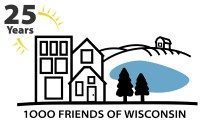Green Tier Legacy Communities – A New Pathway to Sustainability
Communities in Wisconsin now have a new program to help them achieve sustainability objectives, thanks to a collaboration between 1000 Friends of Wisconsin, the Wisconsin League of Municipalities, the UW Center on Wisconsin Strategy, the Wisconsin Energy Conservation Corporation and the Wisconsin Department of Natural Resources.
The five organizations came together to take advantage of the state’s Green Tier program to develop a charter that helps communities set sustainability goals and receive technical assistance, recognition and help with grants to achieve those goals. The voluntary program is intended to complement – not replace – ongoing sustainability activities such as The Natural Step or other sustainability pathways. It is also a template for communities wanting to start out on a sustainability program.
The Legacy Community Charter is a legally binding agreement between a municipality and the state that sets a pathway for communities to take actions and share information to achieve superior environmental performance in either water quality or general sustainability practices. The charter is designed to save money, improve a municipality’s impact on the environment, such as reducing green house gas emissions, reducing energy use, and developing a transportation system that improves transit service and walking and biking opportunities. All policies need to be consistent with and complimentary to the municipality’s Comprehensive Plan.
Participating municipalities will be encouraged, but not required to pursue both tracks.
Municipalities subscribing to the sustainability component of the charter will achieve superior environmental performance by using a variety of suggested strategy options that may include:
¨ ‘Build and Buy’ green strategies and programs.
¨ Strategies to promote environmental stewardship in the private sector.
¨ Transportation policies that improve bikability and walkability.
¨ Land use policies and actions that identify, cleanup and redevelop brownfield sites, promote street connectivity and mixed-use development, and protect natural resources.
¨ Energy efficiency improvements
¨ Waste and materials management policies and the use of renewable fuels to reduce total energy consumption throughout the community.
¨ Local government practices that encourage municipal employees to conserve energy, preserve the environment, and decrease greenhouse gas emissions from municipal facilities, services, and vehicle fleets.
¨ Encourage residents and businesses to adopt sustainable practices.
Municipalities subscribing to the water quality component of the charter will achieve superior environmental performance by addressing wastewater, stormwater, drinking water, wetlands, and other water issues in a holistic, watershed based manner. Municipalities will prepare, evaluate and implement an overall watershed plan that integrates the municipality’s full range of water resources issues. This may include the following elements:
¨ Wastewater management, including treatment plant compliance, collection system maintenance and long term sewer service area planning.
¨ Stormwater management including stormwater quality controls, stormwater quantity and floodplain management, and integration with DNR permitting.
¨ Integration of rural water management issues, including agricultural drainage ditch issues and agricultural nonpoint runoff into urban lands within the watershed.
¨ Navigable waters, wetlands and shoreland management including associated habitat issues.
¨ Groundwater management issues including management of groundwater quality, groundwater quantity and regional recharge issues.
¨ Public water supply issues including drinking water quality and water conservation.
¨ Water budget issues, including the overall evaluation of water quantity and quality entering and leaving the watershed considering ground and surface water issues.
Communities may subscribe to one or both of the available tracks.
The Department of Natural Resources has established a resource team of agency experts to assist communities in identifying and implementing strategies to achieve locally set goals. The resource team includes key agency staff in the programs related to air management, forestry, water regulation, environmental remediation, energy and cooperative assistance. The DNR will provide access to senior agency officials so that barriers to sustainable practices may be identified and removed.
Participants in the water track of the Legacy Communities will have additional regulatory flexibility inherent in existing water regulatory programs to address specific standards or requirements of a particular water program.
The Legacy Community Charter is established with the overall goals of enhancing the environmental quality within a community, reducing local costs associated with energy, water and related infrastructure costs and making the community a more desirable place to live.
